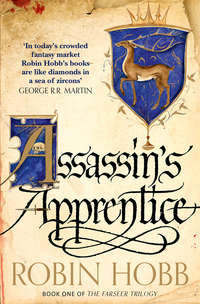
Assassin’s Apprentice
Summer came, bringing warmer weather to our coasts, and with it the Outislanders. Some came as honest traders, with cold-land goods to trade – furs and amber and ivory and kegs of oil – and tall tales to share, ones that still could prickle my neck just as they had when I was small. Our sailors did not trust them, and called them spies and worse. But their goods were rich, and the gold they brought to purchase our wines and grains was solid and heavy, and our merchants took it.
Other Outislanders also visited our shores, though not too close to Buckkeep Hold. They came with knives and torches, with bows and rams, to plunder and rape the same villages they had been plundering and raping for years. Sometimes it seemed an elaborate and bloody contest: for them to find villages unaware or underarmed and for us to lure them in with seemingly vulnerable targets and then to slaughter and plunder the pirates themselves. But if it were a contest, it went very badly for us that summer. My every visit to town was heavy with the news of destruction and the mutterings of the people.
Up at the keep, among the men-at-arms, there was a collective feeling of doltishness that I shared. The Outislanders eluded our warships with ease, and never fell into our traps. They struck where we were undermanned and least expecting it. Most discomfited of all was Verity, for to him had fallen the task of defending the kingdom once Chivalry had abdicated. I heard it muttered in the taverns that since he had lost his elder brother’s good counsel, all had gone sour. No one spoke against Verity yet; but it was unsettling that no one spoke out strongly for him either.
Boyishly, I viewed the raids as a thing impersonal to me. Certainly they were bad things, and I felt sorry in a vague way for those villagers whose homes were torched or plundered. But secure at Buckkeep, I had very little feeling for the constant fear and vigilance that other seaports endured, or for the agonies of villagers who rebuilt each year, only to see their efforts torched the next. I was not to keep my ignorant innocence long.
I went down to Burrich for my ‘lesson’ one morning; though I spent as much time doctoring animals and teaching young colts and fillies as I did in being taught. I had very much taken over Cob’s place in the stables, while he had gone on to being Regal’s groom and dog man. But that day, to my surprise, Burrich took me upstairs to his room and sat me down at his table. I dreaded spending a tedious morning repairing tack.
‘I’m going to teach you manners today,’ Burrich announced suddenly. There was doubt in his voice, as if he were sceptical of my ability to learn such.
‘With horses?’ I asked incredulously.
‘No. You’ve those already. With people. At table, and afterwards, when folk sit and talk with one another. Those sorts of manners.’
‘Why?’
Burrich frowned. ‘Because, for reasons I don’t understand, you’re to accompany Verity when he goes to Neatbay to see Lord Kelvar of Rippon. Lord Kelvar has not been cooperating with Lord Shemshy in manning the coastal towers. Shemshy accuses him of leaving towers completely without watches, so that the Outislanders are able to sail past and even anchor outside Watch Island, and from there raid Shemshy’s villages in Shoaks Duchy. Prince Verity is going to consult with Kelvar about these allegations.’
I grasped the situation completely. It was common gossip around Buckkeep Town. Lord Kelvar of Rippon Duchy had three watch towers in his keeping. The two that bracketed the points of Neatbay were always well-manned, for they protected the best harbour in Rippon Duchy. But the tower on Watch Island protected little of Rippon that was worth much to Lord Kelvar; his high and rocky coastline sheltered few villages, and would-be raiders would have a hard time keeping their ships off the rocks while raiding. His southern coast was seldom bothered. Watch Island itself was home to little more than gulls, goats and a hefty population of clams. Yet the tower there was critical to the early defence of Southcove in Shoaks Duchy. It commanded views of both the inner and outer channels, and was placed on a natural summit that allowed its beacon fires to be easily seen from the mainland. Shemshy himself had a watch tower on Egg Island, but Egg was little more than a bit of sand that stuck up above the waves on high tide. It commanded no real view of the water, and was constantly in need of repair from the shifting of the sands and the occasional storm tide that overwhelmed it. But it could see a watch fire warning light from Watch Island and send the message on. As long as Watch Island tower lit such a fire.
Конец ознакомительного фрагмента.
Текст предоставлен ООО «ЛитРес».
Прочитайте эту книгу целиком, купив полную легальную версию на ЛитРес.
Безопасно оплатить книгу можно банковской картой Visa, MasterCard, Maestro, со счета мобильного телефона, с платежного терминала, в салоне МТС или Связной, через PayPal, WebMoney, Яндекс.Деньги, QIWI Кошелек, бонусными картами или другим удобным Вам способом.
Вы ознакомились с фрагментом книги.
Для бесплатного чтения открыта только часть текста.
Приобретайте полный текст книги у нашего партнера:
Всего 10 форматов